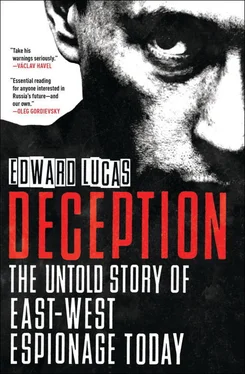5
Spycraft: Fact and Fiction
Spies break rules for governments that try to enforce them. In this contradiction lies the fascination of the espionage world and also its greatest weakness. [24] x I focus in this chapter on solely HUMINT (the recruitment and running of human sources) not SIGINT (electronic intercepts) or geospatial reconnaissance (via satellite). I am also leaving out, among other intelligence professionals, the analysts and reporting officers who make sense of the spies’ work.
Espionage involves breaking laws, perhaps of your own country, more often of its allies and certainly in the country being spied upon. The reason is simple. Secret information may come through deduction and inference, or from exploiting the other side’s carelessness by bluff and subterfuge. But the blunt fact is that for the most part secrets must be stolen. This means instigating treachery, using bribery, burglary, blackmail or outright violence as necessary. That is a long way from the normal tasks expected of a public servant. It attracts a certain kind of person, often flawed or troubled, and shapes them to its needs, to the point that deceit arouses not repugnance, but professional curiosity and admiration. Before looking at the battlefield of the East–West spy wars, it is necessary to understand the mentality, training and selection of the soldiers.
The first quality of a good spy is to shun and shed the social mores that hamper deceiving, cheating and manipulating people. An early exercise during IONEC (the six-month ‘Intelligence Officers New Entry Course’) at Britain’s Fort Monckton spy school on England’s south coast is to gain as much personal information as possible from people in a pub: a prize goes to anyone who obtains passport details. A second is to borrow money from strangers. Some well brought-up trainees find this so demeaning that they quit. Other agencies use similar training games. Israel’s Mossad sets recruits the task of inveigling entry into a stranger’s apartment and appearing on the balcony drinking a glass of water; watchers in a car park below will see who succeeds. Spying is a job for the nosy and devious, not the shy and the scrupulous.
If moral ambiguity is part of the lure, another element is the glamour of secrecy. Nobody cares how and where the government trains its tax inspectors; but the location and topography of Fort Monckton, the names of the courses and their content are secrets. [25] y This former Napoleonic fort, once used by Britain’s wartime Special Operations Executive, is not as secret as perhaps it should be. Its postcode is PO12 2AT; other details including a telephone number are available on the internet.
Outsiders catch only fleeting glimpses of life in the shadows, usually in carefully sanitised form. Secrecy and flawed fictional depictions fuel misperceptions. These would not matter were spying a branch of government service with limited relevance to the outside world, such as drafting fire regulations. But espionage is connected directly into nations’ most vital interests and their most ruthless pursuit. Those wanting insights into complicated geopolitical competition in finance, law or diplomacy are more likely to read the Economist than a novel. But concerning the no less intricate world of espionage, every cinemagoer and novel-reader has a (usually mistaken) impression of life in the shadows. This is one reason that the arrest of the ten Russian spies in America in June 2010 attracted such ill-informed commentary.
Drama and suspense require that fictional spies swing into action at a second’s notice, rather than wasting time writing operational plans and worrying about overspending their budgets. They are untroubled by the nagging concerns of counter-intelligence: the weaknesses – human, financial, bureaucratic, operational and technical – that an enemy could exploit. Routine and discipline are the tiresome exception, not the mundane rule. Equipment appears as if by magic and always works. These exciting exploits bear as little relation to real espionage as Star Wars does to astrophysics. Though spies such as le Carré’s cerebral George Smiley do exist, in real-life espionage brain-boxes are as rare as sex-gods. Real intelligence officers – as the professional employees of state spy agencies are called – generally do not know how to pick locks, steal cars, create explosive devices from household chemicals or disable an assailant with a single punch. 1They hate standing out in a crowd, don’t wear flashy clothes and certainly don’t flirt. Their job is to get unnoticed from A to B, to perform task C and return. Scriptwriters would find that rather dry.
Moreover few intelligence officers steal secrets directly: it is too hard to get the right access, and too risky to exploit it when gained. Their main role is recruiting others to do the dirty work. Here the real talent kicks in: successful spies tend to be good at dealing with people – unobtrusively, imaginatively and persuasively. They could easily be executive coaches, psychotherapists, salesmen, confidence tricksters or (scraping the barrel) journalists. Their job is to extract information and consent by concocting and administering the right cocktail of pressure, ideology, flattery and money.
Each ingredient has its drawbacks. Blackmail can be a jolt that offers an opening for other, more durable means of persuasion; but the resentment it creates limits its usefulness. The victim twists and turns in his mind, desperately seeking a way out – which may be suicide, flight or confession, not treason. Blackmail works best when it comes from a third party, with the intelligence officer appearing as a friend, brokering a deal that involves betraying (initially minor) secrets. Ideology plays a diminished role but can also be useful. A Russian intelligence officer may play on anti-Americanism (most often in allied countries, but sometimes even in the United States). Western recruiters have used Russians’ dislike of the regime’s authoritarian crony capitalism. Flattery is the most potent technique. A friendly voice passing favourable judgement on work overlooked by an unappreciative boss is one of the most formidable weapons in the intelligence officer’s arsenal, particularly when dealing with a ‘developmental’ agent: one who is on the road to treachery, but not yet arrived. When and if the real nature of the clandestine relationship becomes clear, flattery can be crystallised in the form of a rank or a medal.
A final complementing ingredient is money. This can be paid as ‘expenses’ or ‘salary’, whichever seems less demeaning. (Many of the biggest traitors, from Britain’s Kim Philby to Estonia’s Herman Simm, have insisted that they were not mere turncoats but the other side’s employees.) Money on its own has its limits though: it buys information, but not loyalty. The sneaking suspicion in any intelligence relationship based chiefly on cash is that if a higher bidder comes along, the first customer can easily come last. A taste for treachery is often accompanied by a fast-growing appetite. [26] z A related problem is that a single money-grubbing source may sell the same, slightly tweaked, information to several agencies: to America’s CIA and Germany’s BND for example. A dubious piece of information checks out from several seemingly different sources, and counts as solid. Yet behind it is just one agent, single-mindedly maximising his income. It is this that lay behind the colossal blunder that Western intelligence made over Iraq’s supposed weapons of mass destruction.
Praise a source for what he does and he demands more. Criticise him and he will say that he needs to take still greater risks – and demands more. Recruiting an agent from an impenetrable country such as North Korea is even harder; he may demand a huge sum of money for making any contact at all, and then disappear. Has he been caught? Has he simply disappeared to Brazil to enjoy life at your expense? Was the whole thing a dangle designed to boost the other side’s operational funds? You will never know.
Читать дальше












